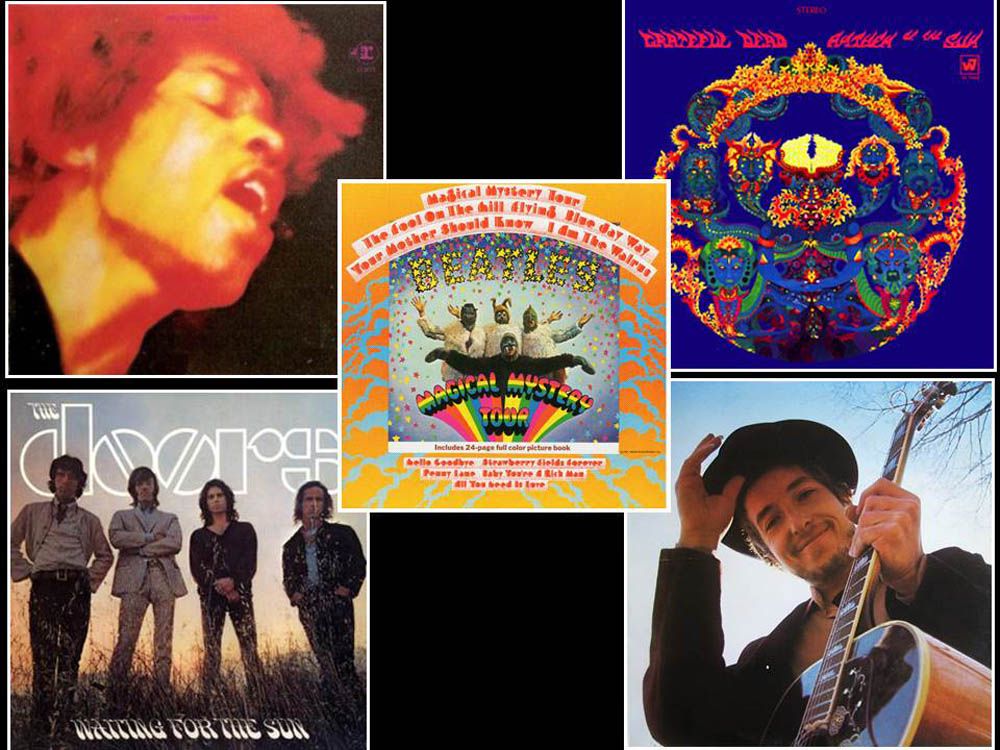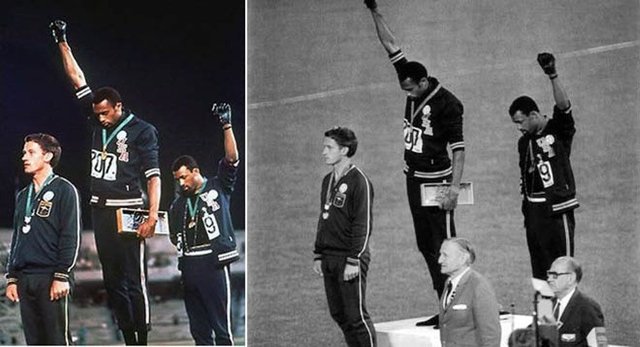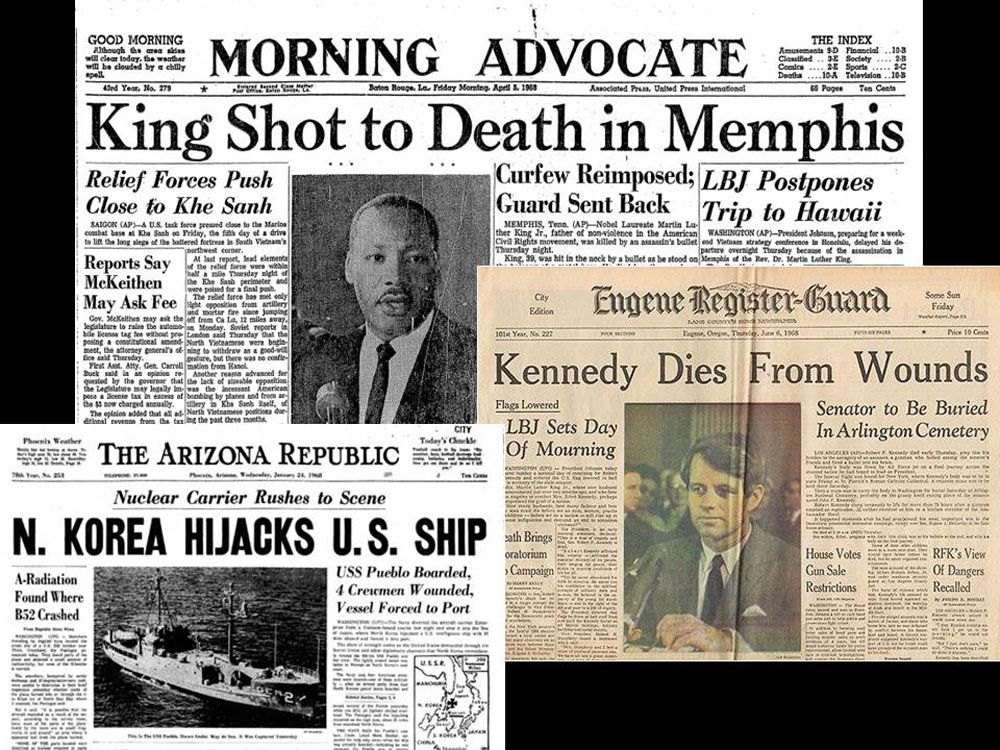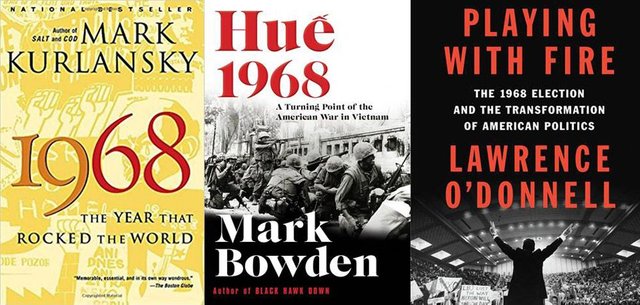No question about it: 1968 was no ordinary year, not by a long shot.
We’ve known that for a long time. Having been there (the Fall of 1968 coincided with the start of my senior year of high school) I can attest that people knew it, and felt it then.
In 2018 we’re acknowledging the 50th anniversary of a very “interesting” and important time.

And now, once again, we’re collectively sensing that the year just started will be, for better or worse, another special time in the long arc of history.
So what do we do? We turn to the past to help see, to help predict, our own future. We seek comfort in the chaos of what is not longer a threat to us, whether that makes sense or not.
How tough was 1968? As U.S. News and World Report recently put it: “In 1968, the country seemed to be having a nervous breakdown.” … “It was a hinge point in history, one of the most consequential and tumultuous years in the American experience, and it changed the country forever.”

America was “beset by internal divisions along racial, gender and generational lines,” writes Jennifer Rubin from The Washington Post:
It was “a year in which both Democratic presidential candidate Robert F. Kennedy and the Rev. Martin Luther King Jr. were assassinated and several American cities went up in flames. In the Vietnam War, the Tet Offensive blew apart Lyndon Johnson’s narrative of the war, the My Lai massacre occurred and nearly 17,000 Americans were killed in the deadliest year of the war. Avowed segregationist George Wallace ran for president, winning 46 electoral votes. Police brutally put down riots in Chicago at the Democratic National Convention. The Soviet Union crushed the Prague Spring. “Biafra” became synonymous with mass starvation. In short, 1968 was a horrifying year in which the United States seemed to many to be coming apart at the seams, and the world seemed doomed to a cycle of war, repression and deprivation.”

"America nearly lost its mind and its soul,” claims U.S. News and World Report.
But something else happened: “The nation reinvented itself and became a more-tolerant, less-constrained place, more willing to let people express their individuality and challenge authority. Overall, the upheavals of that year, both positive and negative, made it clear that once social change reaches a critical mass, it can't be stopped.” For worse, sure, but also for the better.
So, “as we go through 2018,” suggests Rubin, “we would do well to keep 1968 in mind, if only for the sake of some needed perspective.”
And what we’re talking about is more than perspective.

It’s history.
Every once in a long while we encounter such a year, one that cries out to be interpreted, again and again, in historical terms. All year long we’ll be reminded of the importance of what took place fifty years ago. We’ll read The Atlantic as it marks “a particularly momentous year” in a series entitled “1968 and the Making of Modern America.” We’ll be reading about it in Mark Kurlansky’s book 1968: The Year That Rocked the World, in Mark Bowden’s Huế, 1968, and in Lawrence O’Donnell’s Playing With Fire: The 1968 Election and the Transformation of American Politics, as well as in other accounts of the great cultural shifts that took place a half-century ago.
The year 1968 was definitely one of those years.
Stay tuned for our case that 1918—fifty years before 1968 and one hundred years ago—was another. We’re figuring that 2018 just might be another one of those years, too.
And so, in partnership with @sndbox, this Steemit account will be a space to explore history, empower education and endow meaning. As a platform for public history graduate students and Steemit readers, Temple University’s “Nonprofit Management for Historians” will be a crypto-learning-experiment. Stay tuned for more pre-semester posts here from Professor Kenneth Finkel, @kenfinkel in Temple University’s College of Liberal Arts.
Sources: 1; 2; 3; 4; 5; 6; 7; 8; 9; 10.

Excelente trabajo como siempre
Downvoting a post can decrease pending rewards and make it less visible. Common reasons:
Submit
I was not born in 1968, so it is very interesting to know the situation there from the side of your view and the media. Thanks so much @phillyhistory.
Downvoting a post can decrease pending rewards and make it less visible. Common reasons:
Submit
Thanks or reading @ayijufrdar. It was an exciting time to be young.
Downvoting a post can decrease pending rewards and make it less visible. Common reasons:
Submit
Great history lesson
Downvoting a post can decrease pending rewards and make it less visible. Common reasons:
Submit
Thanks @normalbro. Thing is, since I remember it, I don't really consider it history!
Downvoting a post can decrease pending rewards and make it less visible. Common reasons:
Submit
This post has been deemed resteem & upvote worthy by your friendly @eastcoaststeem ran by @chelsea88 (not a bot)
Downvoting a post can decrease pending rewards and make it less visible. Common reasons:
Submit